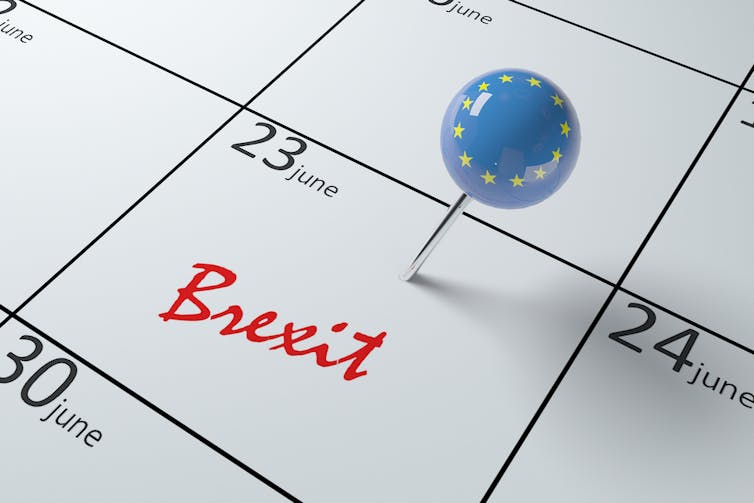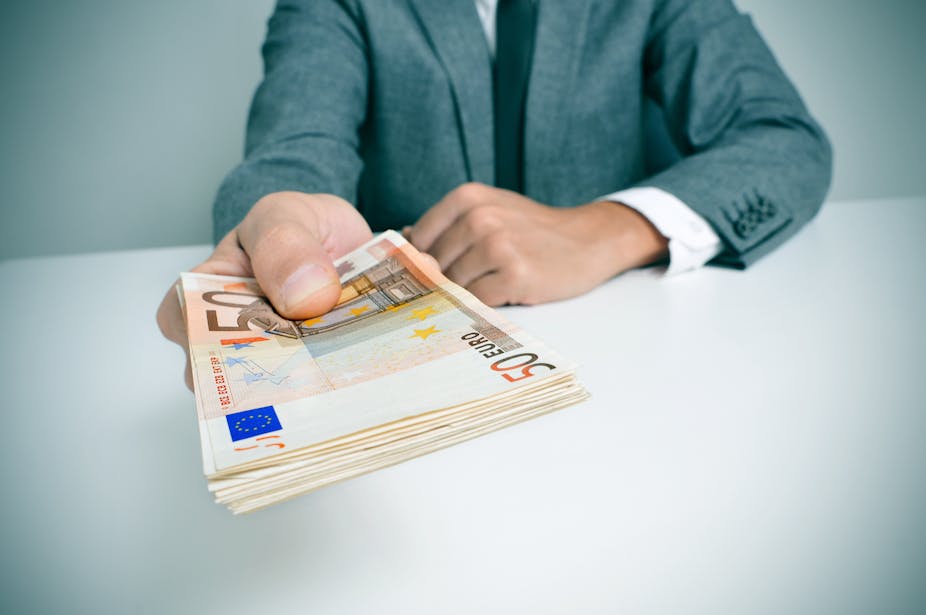The betting markets currently suggest that the odds on the UK voting to leave the EU are about 4-1, implying a probability of leaving of 20%. That means that if you stake £100 on a Brexit, you stand to get £500 back if the country votes to leave, giving a nice profit of £400. A pretty good return over one month. Of course, if the UK voted to remain you would lose £100.
But if you are going to bet on Brexit, why don’t you show that you are a broad minded internationalist, and place the bet in euros? You get the same odds but it could be a much better deal for you. Why so? Because most people expect sterling to fall against the euro, possibly even reaching parity, if the UK leave the EU, and rise in the event of staying in. If you place your bet to leave in euros, then, you get paid your winnings in euros which will have gone up in value. If you lose, you will have paid out in euro, but that would be less painful than paying out in sterling which is expected to appreciate in the event of a remain.
Of course, if you want to bet on Bremain at odds of say 1-4, the converse applies – place your bet in sterling. You get paid in appreciating sterling with a stay, and pay up in depreciating sterling a leave. This opens up a third, intriguing possibility. What if you back both horses in this two-horse race? Bet your £100-worth of euros on Brexit and bet in sterling on Bremain. You should come out ahead whether the UK votes to stay or leave.
The winning combination
The current exchange rate is €1.30 to the pound. With your euro bet, you lose your €130 stake the UK stays but make a profit of €520 (£400) if it leaves. If you bet £400 sterling on Bremain, you make a profit of £100 if we stay, and lose the £400 if we leave.
If the exchange rate stays at €1.30, your two bets will offset each other whichever way the vote goes – your euro winnings and sterling losses, or your euro losses and sterling winnings will cancel out. But if the UK vote to exit, and if the currency markets behave as expected, with sterling falling to say €1.20, your profit of €520 will be worth £433, and you will net a tidy profit of £33 after taking account your losing sterling bet on remain.
Similarly, if the UK votes for remain, and the exchange rate moves to €1.35, you will still make a profit, albeit a rather smaller one of about £4.

The opportunity to make money – however little – at the expense of the bookies is very attractive. In practice, things are not quite so easy. Much, if not all, of your profit will be eaten up by the bookie’s spread and any commission charges you have to pay. And it is risky. It is quite possible that in the event of a vote to remain, the pound trades below its current level or that there is an exit and the pound trades higher than now.
So, this is really just a bit of fun rather than a genuine tip, an intriguing conceit rather than a practical way of making loads of money. It does, however, raise a number of questions for those who believe in the wisdom of markets. Why are the odds the same in euro and in sterling? If you believe that sterling will be 15% lower against the euro if there’s an exit from the EU, the odds on Brexit in euro should be a lot shorter than those in sterling. So why don’t the bookmakers change the odds according to the currency of the bet?
The currency anomaly
One reason may be that their systems are not set up to do it. They do have significant currency exposures in their normal business of sports betting – when Manchester United competes against Barcelona, I guess they have many more sterling bets on the UK side and euro bets on the continental one. If sterling strengthens and Man U wins, or if sterling weakens and Barcelona wins, they stand to lose money. They therefore have some currency risk which is virtually impossible to hedge since the direction of exposure depends on the outcome of a football match.
But the risk is random. There is no significant correlation between which side wins and what happens to the exchange rate. The Brexit betting is different because of the strong connection between the outcome and the exchange rate. If political betting were a more substantial part of their business they might decouple the rates in different currencies, but as it is, the amount they are likely to lose from people exploiting the current system is probably small.
A second issue concerns the interpretation of betting markets. People tend to assume that the odds accurately reflect the market’s view of outcomes. But which market? The sterling market shows a probability of Brexit of 20%. If the euro market were not artificially tied to the sterling market, it would be showing a probability of nearer 24% because of the exchange rate effect. Which number represents the market’s estimate of the probability of Brexit? Arguably the euro (or better still the dollar market) odds because the betting is in a more stable currency whose value is less dependent on the outcome of the event that is being bet on.

